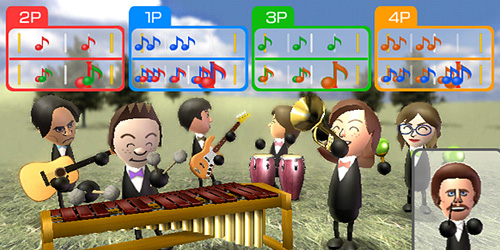
A few weeks ago Nintendo released Wii Music for its Wii game console. The latest in the line of “Wii” games, Wii Music has been received to mixed reactions to say the least. Reviewers have had a hard time coming to grips with the intentionally perpendicular direction Nintendo has chosen to take the “music game” genre. And these different qualities have created a lot of negative feedback from both gaming press and gaming masses as Wii Music defies conventional wisdom on what a music game should be.
Music games are no newcomer to the videogame scene. You can stretch all the way back to the Nintendo Famicom Disk System with Otocky released in 1987. Games like Dance Dance Revolution and ParRappa the Rapper and their sequels also briefly brought music games back into the forefront. But it wasn’t until Harmonix came out with Guitar Hero (and later Rock Band) did music games really hit the mainstream. This form of music game, sometimes lovingly referred to as fake plastic rock, has been some of the best–selling titles of the past few years and have ingrained in the minds of many the concept of the music game.
Games like Guitar Hero and Rock Band aren’t just music games like their predecessors. In their gameplay they follow many of the conventions now seemingly standard amongst all music games. The gameplay tends to be based off written songs that must be mimicked in some “Simon Says” gameplay fashion. The key difference that Guitar Hero (and later Rock Band) made however wasn’t that they were content to let players copy the music through button presses. Instead they attempted to have you copy the entire experience of playing an instrument. It’s remarkably effective that even though you’re using a controller that often only vaguely resembles the instrument and even more vaguely resembles playing the actual thing, it transforms the experience entirely. You’re no longer just mashing buttons on some funny game controller, you’re acting like a musician.
So now music games almost certainly must have you interfacing in some non–standard method to mimic an instrument (or even better, have a peripheral that simulates the instrument). Wii Music does this to an extent, although not as literally as Guitar Hero. Here the Wii remote and nunchuk act as various instruments although they break down into four basic groups of horn, percussion, strings, and keyboard. The player mimics the motions using the Wii controllers to create sounds. It’s a little crude and simple, but it does the job well enough here and outside of complaints about oversimplification, this isn’t the reason why Wii Music is so polarizing.
The main reason why Wii Music has inspired so much distaste among traditional game critics and game fans is its unorthodox idea on what a music game should be period. Wii Music eschews the conventional wisdom on music games. You can play the game like a Guitar Hero and slavishly follow the rhythm and the beat of the song, but it’s an admittedly terrible experience. Wii Music has neither the song selection or the audio fidelity to stand up to its competitors in that arena. Approached in a traditional manner makes Wii Music look like an utter disaster.
But Wii Music wasn’t designed to just play back songs as they were originally created and getting a high score at the end. In fact, Wii Music discards itself of typical game conventions like score. Wii Music, more than most major music games made today, was designed to be about making music and not about playing music. The entire game is designed around jam sessions that allow you to stretch and skew very simple songs in all sorts of ways. By being able to mix and match musical styles, instruments (and non–instruments) and play the game out of beat and out of rhythm songs can be pushed to the edge of recognition.
It’s this limited freedom which hugely separates Wii Music from other music games. Wii Music transforms the typical game music experience, you move from being the rock star to being the composer. Its an important step to make as by now the Guitar Hero–method has been refined and perfected and the only thing missing is musical content in the form of more licensed songs. Wii Music isn’t about playing content as much as its about making your own musical content. It’s less a game and more of a toy or tool.
Wii Music isn’t flawless though. Wii Music doesn’t help you make music sound good. At points, it feels like its actively working against that goal actually as the game outside of interpreting motions and adjusting the sound of the note to fit the moment in the song doesn’t give you much help in composing these different songs. And it takes a lot of time, effort, and trial–and–error to get good results in the game. Its these missteps that weigh down the package and prevent Wii Music from reaching its lofty goals.
Masaya Matsuura is a musician and game creator most known for the PaRappa the Rapper series of games. In a recent interview with Game Developer, he discusses this paradox of music in games and music games, where the trend has gone towards orchestrated or licensed songs that don’t use any of the advantages of the gaming medium. And he says, “I have come to feel that the music game genre is starting to outgrow itself and is now challenging us to expand its possibilities.” Wii Music may go down as an unsuccessful experiment. But one must note that despite its failure it was a worthwhile experiment. And moving forward if we hope to go beyond the confines of Guitar Hero and Rock Band we need to look for ways — like in Wii Music — where gamers can play the music and not just playback.
Leave a Reply